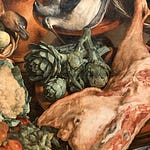For every major prophet — rebels and mystics — whose words become religion, there are 100 minor prophets — baptists and soothsayers — who are merely shadows of what was to come. For every minor prophet are 100 failed prophets — madmen and prisoners — whose visions of a world to come were never more than rackets among marketplaces. Yet, but for a changing wind, any of the failed prophets may have been minor ones, any of the minor may have been major, and the ladder may just as easily have been a snake. Our Gods of doves and grace, of sin and conquest, may just as easily have been our Gods of bulls and purity, sacrifice and pleasure. We may just as easily be sitting beneath our Temple of the Eagle, reading of some obscure madman whose followers, for mere months, believed he had turned to bread and wine, which they devoured, worshipping the image of his dying body, brutally and lawfully executed.
The same can be said for politics. Had we all been speaking German now — or French, Arabic, Russian or Dutch — it would seem to us no stranger than English. All our Kings are merely traitors that triumphed, all our revolutions merely ennobled mutinies. There are reasons, of course, good, material reasons that make history, why things succeed or fail, but if the present were any other, it would be no more strange. What is normal now was alien once, and will become alien again. What is alien now would become quotidian within the blink of a solar eye.
As with religion, as with politics, so with sex. We might enter our teens with the kiss with tongues as a limit of desire and disgust, never imagining what, by small steps, would become the thing we crave. Yet like religion, it seems sheer serendipity that gives birth to desire. For E.M. Forster, the novelist of impeccable English repression, it was the brush of a hand. In 1913 he visited his friend Edward Carpenter, the grand old socialist queer, the utopian of rough trade. Carpenter lived openly, so openly, with his lover George Merrill, together for almost forty years. The three were old friends; at some point, George placed his hand upon him. Years later Forster would remember:
‘George Merrill also touched my backside – gently and just above the buttocks. I believe he touched most people’s. The sensation was unusual and I still remember it, as I remember the position of a long vanished tooth. It was as much psychological as physical. It seemed to go straight through the small of my back into my ideas, without involving my thoughts. If it really did this, it would have acted in strict accordance with Carpenter’s yogified mysticism, and would prove that at that precise moment I had conceived.’
This small gesture, as much friendship or camaraderie as eros, unlocked in Forster a view to an entire homosexual cosmos. It also inspired in him his novel Maurice, which would be published posthumously in the 1970s, so concerned was he with the reaction, and only then thanks to the intervention of Christopher Isherwood. For the rest of us, we might not expect from a touch a novel, but rather a thing, a peccadillo, or, if we’re lucky, a full-blown kink. A youthful glimpse of a fresh white cotton sock, the smell of smoke on the breath from painted lips, a word harshly spoken — these are the things from which fetishes are made; these chance and lucky moments turn us into prophets of desire. For me, it was a simple couplet — “Yes,
anything”
Ever since I read David’s short series on the problems of “kink as therapy”, I’ve been experiencing my own string of little transformations. The series interrogates an increasingly dominant, as it were, strain of conversation, of justification, of kink practices as being akin to, or even actually being, therapy. Built into this discourse is a relationship with the flourishing “wellness” industry, and, with it, a suppression of the faggier, nastier, and increasingly criminalised aspects of kink subcultures. Think of kink as a protein shake, an online skype with your therapist while on a weekend getaway, an adjunct to your yoga practice: these things will all help you grow as a person, overcome your traumas, and become fitter, happier, more productive. This, David suggests, is a smoothing off of the edges of human experience, a desire to fit the unfittable within a Wellness framework that must be used to justify almost all human endeavour today (short of overthrowing the wage system or tackling the climate crisis, which are not part of the individualised Wellness project). But the line that has stayed with me was this: I don’t care if it’s good for me. It doesn’t need to be good for me for me to be allowed to do it.
I guess what this stimulated in me was more related to my work than kink per se, although it chimed because, for the past couple of months, I have been thinking through some ideas for a new novel in which kink will be a prominent theme. While working on it I’ve been consistently struggling with an expectation, internally manifest but I think externally introduced, to address those themes in explicitly political ways — to address homosexuality in an explicitly political way where critique is the skeleton on which the story hangs. I was reminded of some of the backlash to Call Me By Your Name a few years ago: its refusal to acknowledge the AIDS crisis, its conflict-free storyline, its idealisation of everything, from twinks to parents to Italy to orchards to bicycle riding. Where, the critics seemed to be asking, was the real queer experience, the rejection, the sickness, the suffering, the critique?
In my mind I have started to associate that response to queer culture with something akin to the Wellness industry: it’s something that flattens out complex human experience into little more than a series of opportunities for personal growth, or, in this case, the elucidation of personal trauma, which is rapidly becoming the same thing. God knows, I’m as guilty as anyone in this; I write now as much in self-examination as condemnation. In trying to write about kink, but always feeling this insistent tide pulling my hand towards an expectation of trauma, I find myself unable to capture something that actually lingers at the bottom of my experience of queerness and kink, which is, at least for me, the unplaceable moments of desire, the small moments of sensual intensity, whose legacies become sexual fixation. It is exactly the white cotton sock (or the sensation of rubber or the moment of schoolyard shame) that is the motor of desire, yet to address those things as purely sensual somehow feels like exposing oneself to the criticism that one is avoiding the political.
Yet I sometimes feel the insistence of queer stories today to be the retelling of more and more trauma is actually part of the creation of a modern gay subject who is always a step-behind and below, infantilised, catching up, a victim. It’s a strange volte-face, though; once upon a time, the tragic queer was a stock-in-trade for the heterosexual writer and audience, while gay writers, although addressing those aspects, often dwelled instead on exactly the things that are now the problem, the mark of privilege: escape, beauty, desire, lust and self-actualisation. It’s not that there’s no conflict in the work of James Baldwin or Jean Genet: it’s that at the nub of a queer experience in their work is the sensual, the joyful, and the temporarily liberating. I think a longing and lusting for the sensual is an under-rated, maybe even absent queer affect in our cultures today. How do we recapture that sensuality, beauty, escapism, as part of the queer canon?
It’s not in abandoning the explicitly political of course, nor the contextualisation of desire within wider problems and privileges, but instead in expanding the approach to queer experiences. Perhaps it is in acknowledging that it’s the intimate and passing, the small moments, that packs the most transformative potency? The potential of sex is sometimes in the ability to generate and capture those moments outside of the overcoded language of queer desire as a list of traumas and challenges. It offers up those little moments of experience that are the fulcrums of our lives, that could lead us to revolution or to prophecy, where we realise things about ourselves, about who we are.
But it also offers something else: long plains of pleasure without meaning, where sensation and joy can just live, like a long summer afternoon with nothing to do and nowhere to go, just sunlight on your neck and a plate of grilled sardines to eat, a breeze to feel. It offers the chance to say I don’t care if it’s good for me. It doesn’t need to be good for me for me to be allowed to do it. Surely in that pleasure we find the really exciting possibility for queer sex, which is meaninglessness; it doesn’t have a purpose, it isn’t the physical expression of an emotional or moral commitment, it doesn’t build to romantic love, it doesn’t do or accomplish or validate anything. It’s about the pleasure of sunlight or spit or leather on skin, and it doesn’t need to be good for me for me to enjoy it. Perhaps it feels more taboo than ever to imagine “what if sex, if queer life, was not just about wellness, or overcoming adversity, or it getting better, but just about pleasure, about satiation, about escape, about eating until you’re sick?”
Thank you again to all my subscribers. Please feel free to forward to anyone who might be interested. For those just visiting, you can subscribe here, and, if you like it, please do share on social media etc. It helps other people find my newsletter.
















Share this post